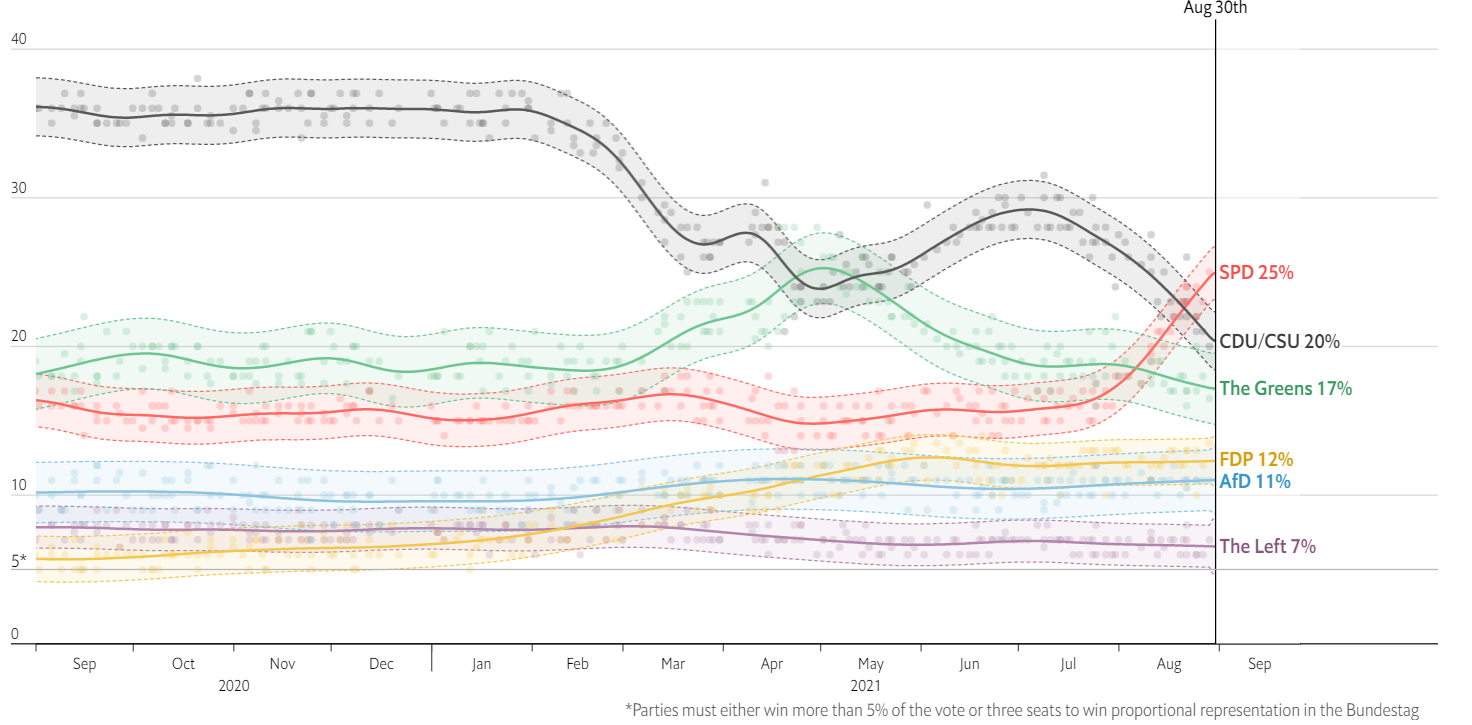As readers may already know, Germans head to the polls on Sunday September 26 to elect a new Bundestag, or federal parliament. In all likelihood, two or three parties will have to form a coalition after the initial results to decide who will succeed Angela Merkel, who is standing down after 16 years as chancellor.
In the lead-up to the hotly-contested election, we’ll share a series of articles analyzing how major markets may react under different scenarios, starting with today’s look at the euro.
Germany’s economy is the by far the largest in the Eurozone, accounting for nearly 30% of the area’s total GDP, so major political developments in the country are highly relevant to anyone trading the single currency. After more than a decade and a half of rule by Merkel’s conservative Christian Democratic Union / Christian Social Union (CDU/CSU) party, the polls are pointing to a tightly-contested race between the CDU/CSU, the center-left Social Democratic Party (SPD) and the liberal Green party:

Source: The Economist
Below, we explore the possible implications for the euro under coalitions led by each of these three parties, though of course the coalition partner(s) will also have a major impact on policies and the market’s reaction:
1. An SPD-led coalition
With a (marginal) lead in the polls as we go to press, a coalition led by the center-left SPD is among the most likely scenarios. While serving as the junior coalition partner with the CDU/CSU for the past eight years, the CDU was able to enact an increase to the minimum wage and changes to labor laws. Led by Germany’s current finance minister and vice-chancellor Olaf Scholz, a CDU-led coalition may be the most “status quo” scenario for euro traders, despite the change in the leading party.
The SPD may be more likely than the CDU to push for additional fiscal stimulus (though not to an extreme extent), which could provide a short-term boost to Germany’s economy and the euro as the country continues to manage the fallout from the ongoing COVID pandemic.
2. A CDU/CSU-led coalition
Angela Merkel will be a tough act to follow, and that responsibility may well fall on Armin Laschet, the premier of North Rhine-Westphalia, Germany’s most populous state. With the CDU/CSU and SPD seemingly at odds after eight years of a coalition, a CDU/CSU victory later this month would likely result in a new coalition and a conservative shift in policy. If that leads to less fiscal stimulus and/or immigration, it could weigh on the growth prospects for Germany’s economy and provide a potential headwind for the euro.
3. A green-led coalition
It’s said that markets absolutely hate uncertainty, and a victory by the left-leaning Green party, led by Annalena Baerbock, would certainly introduce a heavy dose of uncertainty into Germany’s politics. The party advocates for an ambitious climate-change policy, widespread public investment and deeper European integration, which could certainly provide a near-term economic boost for the country, but if that pushes the European Central Bank to keep its monetary policy easier for longer, the euro may struggle as traders come to terms with a dramatic shift in policy expectations.
While the above outlines three different high-level scenarios to watch, along with the potential implications for euro, there are countless permutations of coalitions that traders will have to sift through in the wake of the election.
Be sure to stay tuned for more our analysis and any relevant updates in the final stretch before, and initial reaction after, this month’s highly-anticipated election results.
